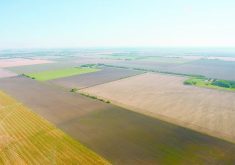STRATHMORE, Alta. – When an Australian agriculture minister told his Canadian hosts he wanted to visit an ordinary farm, he was taken to the home of Kelly and Rhonda Wheeler at Strathmore.
Rory McEwen shed his entourage of assistants, and spent a morning visiting with the young couple over coffee in the kitchen to talk about what all three of them love best: farming.
The agriculture minister for the state of South Australia described his nation’s struggles with drought, low commodity prices, increasing urbanization and farm succession concerns.
Read Also

Sustainable food has ‘lost all meaning’: prof
That marketing strategy is deader than a doornail, says a University of Guelph professor who specializes in consumer preferences and perceptions of agriculture and food.
His words struck a chord on the Wheeler farm, where weather, urbanization, industrialization of the rural landscape and succession are major priorities.
For many Alberta farmers, staying on the land is not the only option. They have watched friends accept jobs from energy companies and face the temptation of moving to a larger city for more money.
“In Alberta, if farming isn’t working for them, they’ll go do something else,” Kelly Wheeler said.
“If you are not making money and it is a struggle, you just aren’t doing this right now.”
Successive generations of Wheelers have been on this farm since 1905, and changes have come with every decade. Acreage developments are increasing and energy companies are on the phone regularly wanting to drill for oil, gas and coalbed methane.
Faced with a strong desire for greater efficiency and productivity to keep the farm viable, the family made a life changing decision in 2001.
The entire family turned itself over to the planners and developed a business and corporate model for the 4,300 acre dryland farm to provide a living for Kelly and Rhonda, his brother Toby and wife Aerin and their parents, Doug and Berniece.
The intention is to some day make room for young cousins who already talk about being farmers.
Having a plan made a major difference. The Wheelers worked with a lawyer and an accountant and had a three hour session with facilitator Ted Darling of Alberta Agriculture.
Over two years they studied other farms that made similar changes and attended extension meetings.
Job descriptions were established, the farm was incorporated and everyone earns a wage.
Kelly was named marketing manager and Rhonda is general manager.
Toby joined the farm full time in 2004, and their father lends a hand wherever needed.
The farm runs on five year plans and is now into its second cycle. There have been changes and disagreements, but a commitment remains to make the plan work.
“In most cases the downfall of most family farms is transition and succession planning and setting up farm management. It’s an ongoing, evolving process because your business changes,” Kelly said.
“Within every five years you’ll have a different structure.”
Kelly and Rhonda represent a new generation of young, educated farmers who want to be involved in networks, research and their community.
He sits on the local feeder association and seed plant boards, while she is on the board of the Wheatland Surface Rights Action Group. Their two young children also keep them busy with minor hockey in Strathmore.
Kelly has a degree in agriculture economics and Rhonda holds a degree in agriculture business management from the University of Alberta. They have kept in touch with university friends who work in the agricultural sector and provide valuable contacts.
Competitive by nature and eager to learn, Kelly has taken the lead role in the family by co-operating with companies such as Bayer Crop Science, Canterra Seeds and Syngenta in trying out new chemicals and seed.
“I tend to be one of the first people that ever sees them and that gives me a one or two year head start on how to use them properly and manage.”
He prides himself on knowing what is going on and trying new things.
“The early adopters are already ahead and the innovators are ahead of them. I like to be somewhere in the middle of them.”
The farm grows a rotation of wheat, barley, canola and peas. As marketing manager he sells the farm’s barley, handles cattle sales from the small feedlot and deals with fixed price contracts through the Canadian Wheat Board. He also makes the major farm input purchases.
The Wheelers prefer to rent rather than buy land, mainly because prices of $2,000 to $4,000 per acre have made land ownership too expensive.
They rent three farms, including the home place, one to the east and one at Carseland, Alta.
“For the majority of people around here, that is how they are growing their acres.”
Kelly said his family’s planning skills and adaptability will allow it to keep farming.
“I think we are set up OK and we will definitely be going at this for a while,” he said.
“I assume we will be doing a good job of it. That is my plan. We’re here to farm to be profitable.”

















